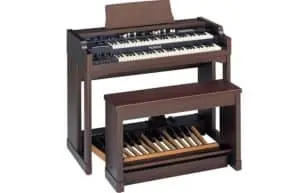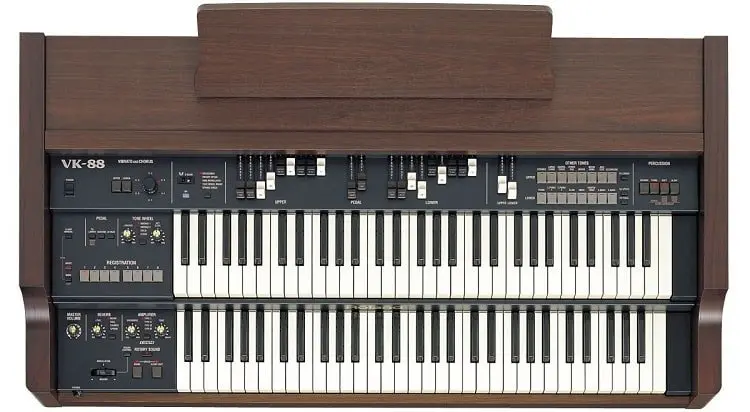
Ever since digital technology has advanced far enough, its application in music became apparent. Nowadays, we have digital everything. From guitar amps to drums.
One thing that is rarely emulated by digital technology are organs. Well, that is not completely true. Every keyboard under the sun has some sort of organ preset, but we are talking about high quality organ emulation.
The reason for the lack of choices in this niche segment of the market is the fact that not a lot of people play organs in any relevant capacity.
Those who do either play acoustic organs, which are rare, or they settle with the emulation found on whatever keyboard they have. With that said, there is another solution. There are digital organs out there which do a great job at emulating this complex instrument. One of the most notable ones is Roland VK-88.
This model is both advanced enough and authentic enough to be used in a professional setting. Today our task is to review this magnificent piece of tech and see what it has to offer.
An Overview
One of the main difficulties with emulating organs on a keyboard is the lack of all the controls this instrument usually has. Sure, the core sound is there, but the player has no way to harness it as they would on the real thing.
This is exactly why you absolutely need to have a dedicated digital organ, or a real one if you plan on using it for any professional application. These include churches and orchestras. A good organ is hard to emulate, that’s for sure. However, Roland has reached quite high with their VK-88.
Features
When you first see Roland VK-88, you will immediately notice it has two manuals with 61 keys on each. That should tell you right away that you are dealing with a very serious instrument. On top of these, there are also two waterfall keyboards. These allow you to play glissandos and other techniques, especially since they have quick firing keys.
There are nine harmonic bars per manual and two harmonic bars for pedals. Additionally you also have two harmonic bars for your orchestral tones. The whole instrument is powered by four different types of COSM amp modeling. That’s a lot of processing power at your disposal.

Roland VK-88 also features a Virtual ToneWheel and rotary speaker modeling, both of which bring this digital organ closer to its acoustic counterpart. Aside from the organ sounds, VK-88 comes with piano presets as well as many other.
Finally, the whole thing is packed in a very nice solid wood cabinet. One of the main drawbacks of average digital instruments are their cases. This doesn’t impact the performance, but there is just something wrong about a gray box being used in a formal setting such as a church. You won’t have to worry about that with VK-88.
Performance
There are two main selling points to this digital organ. First one is obviously the quality of sound it produces. Emulating organs with all of its subtle details i hard. Much harder than emulating a piano.
However, Roland has managed to close the gap between digital and acoustic to a very respectable level. The other main selling point is the amount of controls you have at your disposal. These allow you to play VK-88 in a way you would any other organ. Overall, you will hardly find a better instrument of this type on the market.
What we like
Great sound quality and impressive versatility are what makes the VK-88 one of the few go to models in this segment of the market. It feels very organic, both aesthetically and in terms of feedback you get while playing.
What we don’t like
For one, the price of this model is pretty high. That is not that strange considering it’s a niche instrument.
Conclusion
Roland VK-88 is by far one of the best, if not the best digital organ you can get at the moment. This model offers the level of versatility you just can’t find that easily elsewhere.
If you need an authentic digital organ, this is as close as you can get within a reasonable budget.



